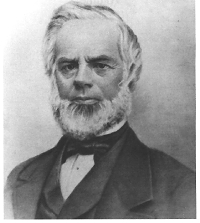Phineas P. Quimby
| Phineas Quimby | |
|---|---|
 |
|
| Born |
Phineas Parkhurst Quimby February 16 [O.S. February 4] 1802 Lebanon, New Hampshire, United States |
| Died | January 16, 1866 (aged 63) Belfast, Maine, United States |
| Nationality | American |
| Occupation | Mesmerist, clockmaker, inventor |
| Known for | Founder of the New Thought |
| Home town | Belfast, Maine |
Phineas Parkhurst Quimby (February 16, 1802 – January 16, 1866) was an American spiritual teacher. Quimby was a philosopher, magnetizer, mesmerist, healer, and inventor, who resided in Belfast, Maine, and had an office in Portland, Maine. Quimby's work is widely recognized as leading to the New Thought movement.
Born in the small town of Lebanon, New Hampshire, Quimby was one of seven children and the son of a blacksmith. As was customary for his social and monetary status at that time, Quimby received little formal education. He suffered greatly from tuberculosis in his youth and was prescribed calomel by his doctor. Instead of curing his sickness, the calomel began to rot his teeth, and Quimby began experimenting with his own ideas for a cure. He found that intense excitement (such as galloping on his horse) alleviated his pain for brief periods of time, and became interested in the mind's ability to affect the body. It is unclear how he found his ultimate cure, but it was through his own devices, and not from the doctor's medicine.
When Charles Poyen, a French mesmerist following in the tradition of Puységur, came to Belfast, Maine, on a lecture circuit about mesmerism around 1836, Quimby was intensely curious. Quimby attended one of Poyen's lectures in 1838, and immediately began plying the mesmerist with questions about the nature of animal magnetism and its powers. Poyen admitted that with proper training, anyone could become adept at administering hypnotism. Quimby left his job as watchmaker and followed Poyen's tour of New England for the subsequent two years (1838–1840), until he became proficient at applying mesmeric hypnotism himself. Around this time Quimby encountered Lucius Burkmar, an uneducated youth who was particularly susceptible to hypnosis. Quimby and Lucius began a tour of their own, practicing mesmeric demonstrations in front of large crowds.
Later Quimby and Lucius stopped touring and Quimby began healing people of ailments which doctors could not cure. Quimby explained to his patients that disease was caused by false beliefs, and that the cure was in the explanation of this. Many letters and documents of Quimby were released only after his son's death in 1921.
...
Wikipedia
